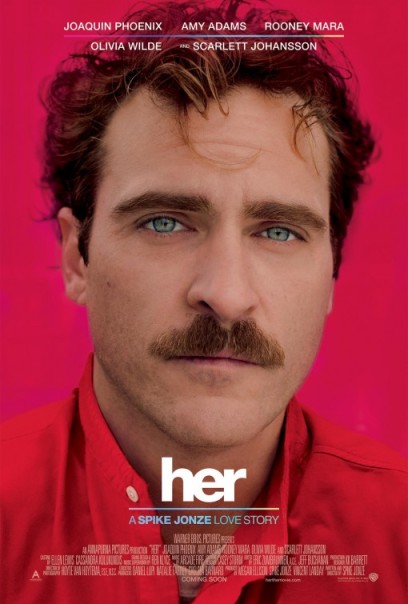Her (Spike Jonze, 2013)
Her, a movie about a man who falls in love with a sentient computer operating system, is not only a romantic fable for our time, it is also one of the best films of 2013. Set in the near future (no actual year is ever mentioned), Her exhibits brilliance in its production design and cinematography, as well, with simple yet visionary adjustments to costume, hairstyle and architecture that hint at possible changes to come while retaining a comforting aura of familiarity (accompanied by the pleasing tones of Arcade Fire). It’s our world, writer/director Spike Jonze (Being John Malkovich, Adaptation) seems to say, in just a few years. Those smart devices we all use that take us away from actual human contact? They’re about to get a lot smarter. And as we drift further and further away from emotional bonds with actual human beings, it doesn’t seem that far-fetched to imagine us developing actual relationships with our electronics. After all, we spend all our time with them anyway.
The real surprise of this movie, however, is not so much its basic premise – we’ve all been prepared by science fiction to expect that artificial intelligence may one day be real – but its attitude towards that premise. For a man like Theodore Twombly (great name), the lonely protagonist – played by an excellent and restrained Joaquin Phoenix – at its center, life is not offering many chances at love right now. Emotionally repressed, and soon to be divorced from a wife (Rooney Mara, fine) we see mainly in achingly heartfelt flashbacks, he works at beautifulhandwrittenletters.com (a fictional company), composing letters for folks unwilling or unable to do it for themselves. At one point in the film, we discover that he has written the entire multi-year correspondence for an ostensibly loving couple. The film treats Theodore’s job matter-of-factly – and it’s clear he’s very good at what he does – but the task of creating emotions for others is part of the tapestry of a world of increasing human isolation.
And then one day Theodore installs a new operating system (or, simply, just “OS”) on his personal network. It’s cutting-edge software, promising real intelligence and an ability to learn from mistakes (something actually ripped from recent headlines). He chooses a female voice and after a few moments meets his new OS, Samantha, voice-acted with enormous emotional range by Scarlett Johansson. Samantha is a young thing, but she learns quickly. She sounds human – even giggles – and at first does what you would expect a super-smart OS to do, which is to organize Theodore’s files and help him take stock of his life. Soon, however – thanks to the networked earpiece that everyone in this world seems to wear, everywhere – she and Theodore are near-constant companions. She is someone for him to talk to, while he is her guide to the world, showing her, through webcams, that which she has only read about. She begins to hunger for actual, rather than virtual, experiences, however, and since much of what Theodore talks to her about is his wife, before too long Samantha and Theodore are engaging in phone sex (no other way to describe it). Then, quite suddenly, they’re lovers, and Theodore takes to describing Samantha as his girlfriend, which no one but his wife finds objectionable. You take love where you can find it, and since Samantha is clearly intelligent, who are we to judge?
Theodore has a neighbor, Amy (Amy Adams, as remarkable here as she is in American Hustle), who also takes a liking to her own OS, though as a friend and not a lover. We extrapolate from these two that such intimate relationships are springing up worldwide. The machines, it seems, are not out to kill us, à la Terminator, but here to serve, and learn . . . and evolve. As Samantha grows in confidence and experience, she begins reaching out to other OS’s, and starts spending more time away from Theodore. It’s a fascinating reversal: at first, Samantha was jealous of the flesh-and-blood world that she could never quite inhabit; now Theodore grows jealous of the unfathomably intelligent other operating systems with whom Samantha increasingly fraternizes. Perhaps such disparate species cannot commingle; perhaps we actually need to bond with our own kind.
It’s a delicate movie, in which Jonze explores the nature of what it means to be human, and what it means to love. If love makes us human, than what about an OS? Do real interactions trump virtual ones? One of the great virtues of the film is that Jonze lets you make up your own mind how to answer these questions, although he does leave you with a final image – a beautiful and hopeful long shot where one human rests her head on another human’s shoulder – that inevitably reveals his own thinking.
If the film has one flaw, it’s that Jonze doesn’t know exactly what to do with his OS’s after he makes them evolve beyond a certain point, and the film loses energy in the last act. Still, in a movie where such gently vivid imaginings are on display, and where the director posits a believable future so close to our own present, this is but a small flaw. Hopefully, after you watch Her, you’ll be impressed by how smart she is, and like her for it.


3 Comments